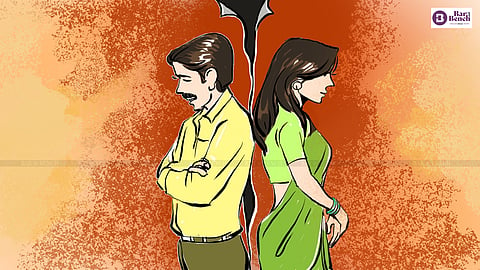
- Latest Legal News
- News
- Dealstreet
- Viewpoint
- Columns
- Interviews
- Law School
- Legal Jobs
- हिंदी
- ಕನ್ನಡ

The Delhi High Court recently observed that if a spouse condones an extramarital illicit or intimate affair, it cannot later be called an act of cruelty in divorce proceedings.
In the present case, the Court found that the wife had expressed her willingness to continue living with the husband, despite such an episode.
Hence, the Court held that such an affair cannot be viewed as cruelty to the wife during divorce proceedings.
“It has been rightly concluded ... that it was an act which was condoned by the appellant who despite this episode, had expressed her willingness to continue to reside with the respondent. Once an act which lasted for a short while had been condoned, it cannot be taken as an act of cruelty while deciding the petition for divorce,” the Court observed.
A division bench of Justices Suresh Kumar Kait and Neena Bansal Krishna added that things would have been different had this illicit relationship been a turning point in the relationship between the husband and wife.
However, in this case, while the brief extramarital intimate relationship from over ten years ago did create some turbulence, the Court found that the spouses were able to sail over it.
The Court also noted that making friends at the workplace or talking to them cannot be held to be a cruel act or an act of ignoring the wife, particularly when the spouses were living apart due to the nature of their work.
“A person who is essentially living alone, may find solace by having friends and merely because he used to talk to his friends, it can neither be held to be an act of ignoring the appellant (wife) nor a cruel act. It has to be appreciated that both the parties having been essentially living separately because of their work exigencies, were bound to make friends at their place of work and otherwise; and such friendships without anything more, cannot be termed as cruelty," the Court observed.
The Court further underscored that in disputes between parents, children cannot be alienated or used as a weapon.
The Court made these observations while dealing with an appeal filed by a woman challenging a family court order granting divorce to her husband on the grounds of desertion and cruelty.
The husband told the Court that he was an Indian Army officer and was posted in different areas for official duty. He said that the relations between him and his wife were estranged on account of the indifferent attitude of the wife. The husband claimed that the wife hardly talked to him, which caused deep frustration and depression in his mind.
The husband further contended that in order to shift the blame on him, the wife wrote various complaints to the Commanding Officer, Family Welfare Organization and the Army Headquarters, making “baseless, frivolous and false allegations” and blaming him for deserting her and their daughter.
Meanwhile, the wife argued that the man had continued with an extra marital relationship and was trying to take advantage of his own wrong by getting rid of the appellant (wife) through divorce.
She denied the allegations made by her husband. She further claimed that the husband would only visit her briefly during his annual holidays and leaves and that during this period, he inflicted physical and mental cruelty upon her.
The Court considered the case and held that the wife had committed cruelty against the husband by alienating their only daughter and writing various complaints to the husband’s superiors.
“Once vindictiveness has crept in and the appellant had marched on to the war path and filed not only complaints in the Department but also initiated various civil/legal cases since 2011, i.e., for about 12 years and has even alienated the daughter from the respondent, it leads to irresistible conclusion that various acts of cruelty have been committed towards the respondent (husband)," the Court said.
The Court, however, said that no grounds of desertion were made out in the case.
“The divorce was also granted on the ground of desertion, but from the above discussion, it is evident that the things had gone to an extent where neither the appellant nor the respondent were in a position to restore their marital ties. In these circumstances, it cannot be held that it was a case of desertion by the wife for a period of more than two years from the date of separation ie July, 2011 onwards," the Court observed.
The Court, therefore, proceeded to uphold the divorce decree on the ground of cruelty alone.
Advocate Anu Narula appeared for the appellant wife.
The husband was represented by advocate Arvind Chaudhary.